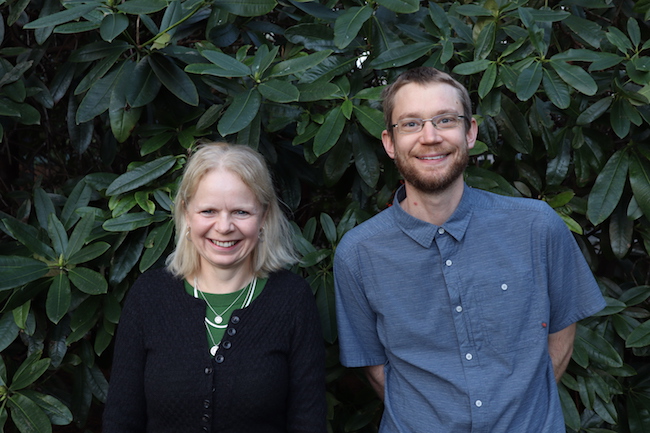
Professor Catherine Day (left) and Dr Adam Middleton.
Otago biochemists Professor Catherine Day and Dr Adam Middleton have secured $1.2 million for a new research project looking into the details of how we defend ourselves against invading viruses.
When viruses invade, it is vital that our bodies know when to turn antiviral defences on (such as the inflammatory response). However, it is equally as important that we turn these defences off again at the right time, or our bodies could start to damage themselves.
Prof Day and Dr Middleton are investigating a specific enzyme involved in turning off a body's inflammatory response. This enzyme is called RNF125 and is a type of 'ubiquitin ligase', a protein that attaches a tag called ubiquitin onto other proteins in order to transmit information inside a cell.
The researchers will figure out exactly how RNF125 operates when it turns off signaling by a protein called Rig-I, an essential molecule involved in recognising when cells have been infected with a virus.
Success in attracting funding for this project is partly thanks to preliminary research carried out by Master's student Thornton Fokkens, and supported by a University of Otago Research Grant (UORG). This is a great example of how small grants like the UORG can help attain high-level funding for projects like these.
Project title: Time for destruction - switching immune responses off
Duration: 36 months
Approved budget: $1,197,433.37
Researchers: Professor Catherine Day, Dr Adam Middleton
Summary:
Initiation and resolution of inflammation is essential for cellular homeostasis, and aberrations are often associated with disease. Following viral infection, initiation of an immune response requires addition of a small protein called ubiquitin to receptors that sense viral RNA, while addition of more ubiquitin molecules terminates the response. As a result, the enzymes that add ubiquitin have key roles in activating and restricting immune responses. Here we will study the ubiquitin ligase RNF125, which helps resolve immune responses. The proposed Project will use biochemical approaches to investigate how RNF125 regulates resolution of inflammatory responses by studying its role in turning off signaling by Rig-I, a key receptor of viral invasion. This work will provide fundamental knowledge about the mechanisms of inflammatory signalling, identify possible molecular targets for cancer and chronic inflammation, and explain how immunostimulatory therapies that are being developed to enhance cancer treatments might achieve maximum benefit.